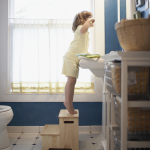Self-esteem is how we feel about ourselves. It is personal, it is relational, and it begins in early childhood. As we move through life, school, social activities, personal characteristics, and interactions within the family all shape our sense of self. Positive praise, especially in relation to a child’s intrinsic characteristics and efforts, is one of the most effective tools to build their self-esteem.
As children learn about the world, they tend to accept without question most of what they are told about themselves. Developing self-esteem from an early age is important – so a child can draw on this as they grow older.
Usually, we talk about ‘high’ or ‘low’ self-esteem. In children, high self-esteem is typically associated with positive attitudes and behaviours, such as happiness, the ability to make friends, ability to overcome difficulties, and positive self-beliefs. In contrast, low self-esteem is usually recognised by a tendency to focus on weaknesses or mistakes, difficulty in recognising positive self-attributes, and blaming oneself for difficulties or failures.
When children receive frequent positive messages from their parents, they are more likely to internalize this form of thinking and use it to strengthen their own confidence. Praise needs to be specific and meaningful. Empty praise does not help, as children won’t internalise it.
Self-esteem can also be ‘secure’ or ‘fragile.’ Individuals with secure self-esteem genuinely like and value themselves for who they are, rather than for their talents or accomplishments. These children also tend to recognise both their strengths and weaknesses, are more socially confident, and manage to ‘bounce-back’ from failures.
On the other hand, fragile self-esteem is based on achievements: ‘what I do,’ rather than ‘who I am’. Children with fragile self-esteem tend to seek constant validation, often boasting or exaggerating their achievements. That is why parents can often misinterpret this kind of behaviour as high self-esteem. But beneath the surface, children might be experiencing difficulty accepting their weaknesses, may tend to blame others for failures, and may not respond well to criticism.
Children who receive praise from their parents develop higher and more secure self-esteem. Notice unique, intrinsic, positive characteristics about your child, and tell them. This means the wonderful personality traits that make them who they are, such as kindness or a good sense of humour. Praise their efforts, not just their successes. That way, children understand that it is ok to fail, and they should be proud for trying, regardless of the outcomes.
This article was contributed by Megan McGinley, Assistant Psychologist, HSE Child and Family Primary Care Psychology Services. HSE Psychology Services are a member of Parenting Limerick, a network of parenting and family support organisations.




